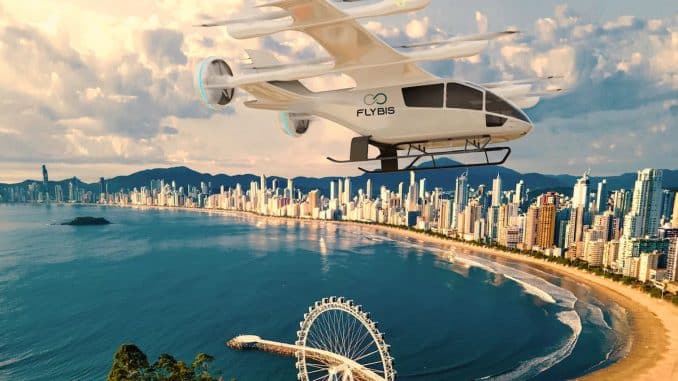
South America’s urban air mobility scene has lately hit a major milestone after a joint effort among Brazilian eVTOL manufacturer Eve Air Mobility (Eve) & the new Brazilian air mobility startup FlyBIS Aviation Limited (FlyBIS) was confirmed.
A lately minted agreement
This December 8th, Eve & FlyBIS signed a Letter of Intent to make official their efforts to work together and expand the prospect of air mobility in Southern Brazil & other South American countries. Per the harmony, FlyBIS will purchase up to 40 eVTOL aircraft manufactured by Eve. With FlyBIS’s order, Eve has a backlog of up to 2,770 electric planes.
The air mobility startup means to start urban air mobility operations with these aircraft by 2026, starting in the Brazilian states of Rio Grande do Sul and Santa Catarina. Once the process in Brazil has commenced, the corporation plans to inflate to other nations in South America.
The ideal aircraft for the project
The future of eVTOLs is growing considerably as more air mobility companies show their effort. Considered electric vertical take-off & landing aircraft that can convey passengers without the requirements for a human pilot, eVTOLs also have the capability to navigate the verticality of cityscapes without the need for big open-spaced runways.
The southern Brazilian city, which is characterized by dense hilltop buildings as well as its dense population, could prove to be the perfect aircraft for the Flybis project using EVTOL. Along with this, it is also being ensured that carbon emissions will not further pollute the dense urban environment and contribute to the environmental sustainability goals of the project.
But why Eve’s EVTOL? The answer to the question lies in the design of Eve’s eVTOL, believes Gustavo Zanetini, the company’s co-founder and CEO. The electric aircraft designed by a multi-pronged Brazilian company is purpose-built with redundancies such as numerous rotors and avionics to make the airplane safe for process in dense municipal airspace.
Additionally, Eve’s design for its eVTOLs also draws support from Embraer. And Eve has access to a competent workforce & global infrastructure to give its eVTOLs the top assurance of security & better integrate the electric aircraft into existing nationwide airspace systems. Zanettini continued by emphasizing:
Bottom line
It’s no surprise that Eve first published the first concept of urban air mobility operations in Brazil. Shortly thereafter, there was a major increase in EVTOL opportunities within the nation. And with startup Flybis planning to work locally, the prospect of urban air mobility in Brazil is one step closer to becoming a reality.



